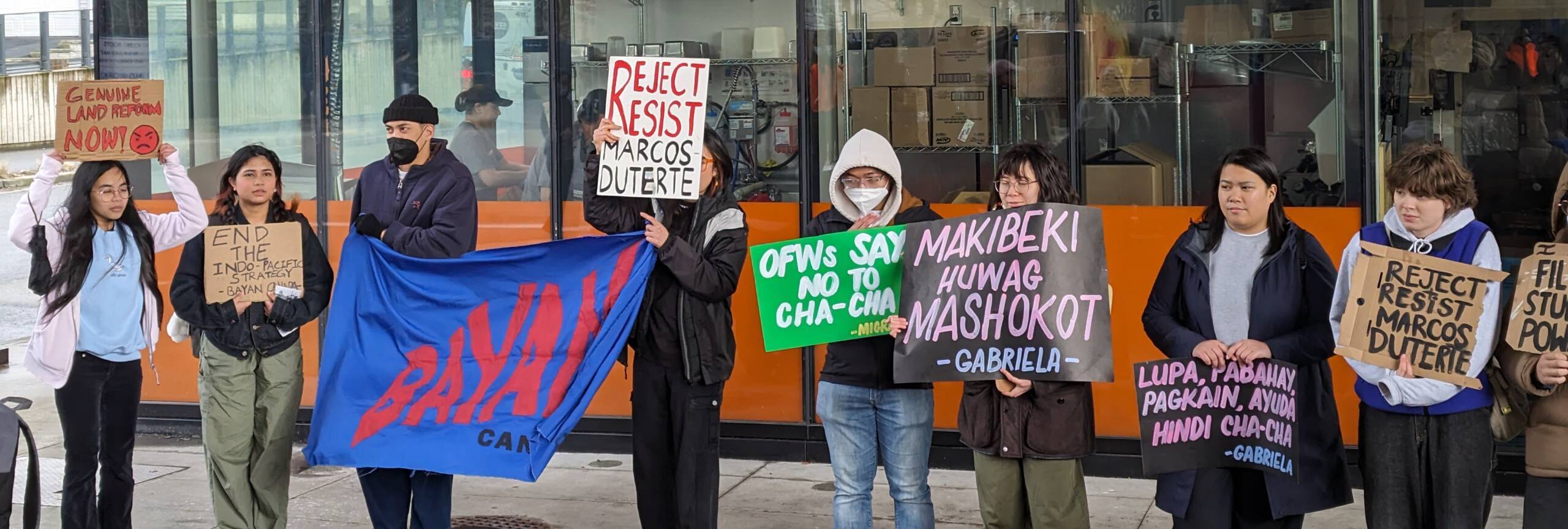On Sunday February 25, rallies and marches in the Philippines and around the world marked the 38th anniversary of the People Power Revolution that ousted Philippine dictator Ferdinand Marcos from power in 1986. This year the protests took on special significance because, under the Presidency of Marcos’s son, Ferdinand Marcos Jr., the day was not slated as a public non-working holiday in the Philippines, as it had been since 2002.
The People Power Revolution, sometimes known as the EDSA revolution because of the mass mobilization of hundreds of thousands of protesters on the Epifanio de los Santos Avenue (EDSA), a main highway through Metro Manila, ended 20 years of dictatorship under Marcos Sr. The protests were the culmination of years of resistance to the dictatorship by workers, peasants, students and other sectors of Filipino society, including countrywide armed struggle led by the Communist Party of the Philippines.
Critics have accused Marcos Jr. of historical revisionism for downplaying and denying the human rights abuses people suffered during his father’s rule, and for his supporters’ social media campaigns portraying the dictatorship as a “golden age” for the Philippines.
Mobilizations marking the anniversary included rallies in communities across Canada. Many of the nearly one million Filipinos in Canada trace their history of family migration to the years of the Marcos dictatorship when political repression and the implementation of policies pushing Filipino workers to find jobs abroad spurned a large wave of migration.
Speaking to a rally in the Joyce-Collingwood neighbourhood of Vancouver, Glory, a spokesperson for BAYAN Canada, an umbrella organization for progressive Filipinos, painted a very different picture:
“The Marcos Dictatorship is remembered today through countless stories passed down by our elders, detailing forced disappearances, tortures, and extra-judicial killings, and the stripping of the basic human rights and democratic freedoms of the broad masses of Filipinos.”

“Prior to his ousting, the Marcos Sr. regime brought historic unemployment, land-grabbing by big landlords and foreign agricultural corporations, and the systematic export of our people as cheap labour through the Labour Export Policy.”
The rally in Vancouver was composed mostly of Filipino youth. Rachel, a member of Filipino youth organization Anakbayan, said that “the EDSA revolution is so important to us, because the youth back then was brave, creative, and created a broad unity between all Filipino people, between all sectors, to be able to oust a dictator like Ferdinand Marcos.”
Winona, who was born more than a decade after the People Power Revolution explained to North Star why she showed up:
“In the 38 years since People Power happened, this is the first year that Marcos Jr. has removed People Power as a national holiday. It’s important that we still hold it to combat the historical revisionism of covering up the tyranny and the human rights violations that the Marcos family has committed, and is still committing today.”
Other participants also noted the continuity between the dictatorship of Marcos Sr. and the continuing human rights violations under Marcos Jr.
“Despite the historic moment of EDSA, these trends of anti-people policy and governance have continued under the succeeding presidents of the Philippines due to the rotten nature of the prevailing system,” said Glory.
In a February 2024 report from the U.N. Office of the High Commissioner on Human Rights, Special Rapporteur Irene Khan noted in particular that the Philippines counter insurgency task force, the National Task Force to End Local Communist Armed Conflict, continues to target journalists, trade union organizers and other human rights defenders.
“In many cases, vilification has been followed by threats, unlawful surveillance, attacks or even unlawful killings,” said Khan. “It intimidates and chills freedom of expression and suppresses legitimate activism, journalism or criticism.”
Filipino human rights organization Karapatan documented 87 extra-judicial killings and 12 enforced disappearances in just the first 5 months of the Marcos Jr. presidency, with the vast majority of human rights abuses committed by the Armed Forces of the Philippines, the Philippine National Police, or paramilitary forces connected to them.
Despite the human rights concerns, a new memorandum of understanding, inked on January 19, 2024, aims to “deepen and strengthen” the relationship between the Canadian and Philippines military, a cause for concern for Rachel:
“It is incredibly important for Filipino-Canadian youth to reject this cooperation because ultimately it does hurt us, here in Canada. The reason there is so much forced migration and so many broken families is because of the military operations back home.”


Be part of the conversation!
Only subscribers can comment. Subscribe to The North Star to join the conversation under our articles with our journalists and fellow community members. If you’re already subscribed, log in.